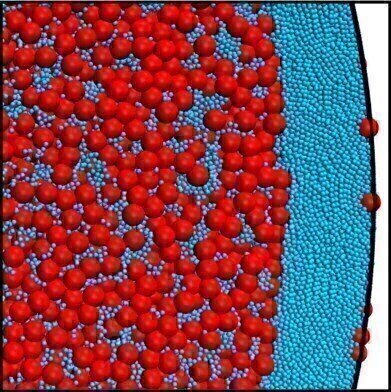-
 An example of the synthesis of a supra-particle made up of many small and large particles. The drying process is controlled in such a way that an interface forms, with the larger particles grouping together at the center. Ill./©: Midya Jiarul, JGU
An example of the synthesis of a supra-particle made up of many small and large particles. The drying process is controlled in such a way that an interface forms, with the larger particles grouping together at the center. Ill./©: Midya Jiarul, JGU
News
DFG Funds Research on Self-Organisation of Soft Matter
Jan 10 2020
The German Research Foundation (DFG) is funding a new project to explore the role of interfaces in the synthesis of soft advanced materials and how these interfaces influence their resulting properties. "Our aim is to better understand self-organisation processes in the presence of interfaces so that we can subsequently manipulate them," explained Professor Thomas Speck, coordinator of the new DFG Research Training Group at Johannes Gutenberg University Mainz (JGU). The Max Planck Institute for Polymer Research (MPI-P) in Mainz and Technische Universität Darmstadt are also research partners in the new Research Training Group 2516 ‘Control of structure formation in soft matter at and through interfaces’ which has received EUR 3 million over the coming four-and-a-half years. The project is scheduled to start in July 2020.
"With the high quality of its application, Johannes Gutenberg University Mainz once more convinced the German Research Foundation and I congratulate all those involved in this achievement. The establishment of the new Research Training Group will promote innovative research programs in the field of soft matter and contribute to the development of young researchers. Thanks to the involvement of the Max Planck Institute for Polymer Research in Mainz and Technische Universität Darmstadt as strategic cooperation partners, early career researchers will have access to the best facilities in the Rhine-Main region. This will further enhance Mainz as a science hub," added Professor Konrad Wolf, Minister of Science, Continuing Education, and Culture in Rhineland-Palatinate.
Interfaces are used routinely to control and accelerate processes in chemical or physical applications of soft matter. "It is thus important that we manage to tailor the functioning and the responsiveness of interfaces to our precise requirements," said Professor Thomas Speck. By means of predefining an interface it is possible, for instance, to manipulate the linking of molecules so that the self-organisation process then follows a specific plan. As a result, soft materials can be produced that have very specific mechanical, optical, or electronic properties.
Digital Edition
Lab Asia Dec 2025
December 2025
Chromatography Articles- Cutting-edge sample preparation tools help laboratories to stay ahead of the curveMass Spectrometry & Spectroscopy Articles- Unlocking the complexity of metabolomics: Pushi...
View all digital editions
Events
Jan 21 2026 Tokyo, Japan
Jan 28 2026 Tokyo, Japan
Jan 29 2026 New Delhi, India
Feb 07 2026 Boston, MA, USA
Asia Pharma Expo/Asia Lab Expo
Feb 12 2026 Dhaka, Bangladesh


















